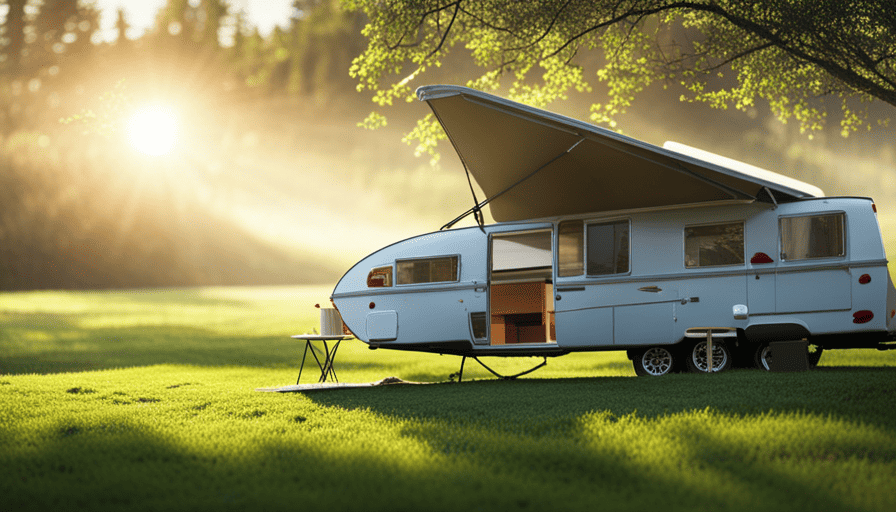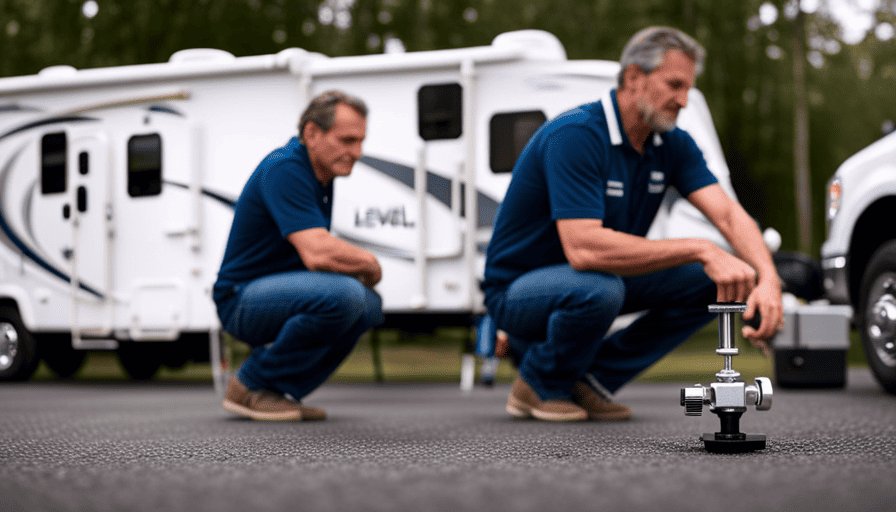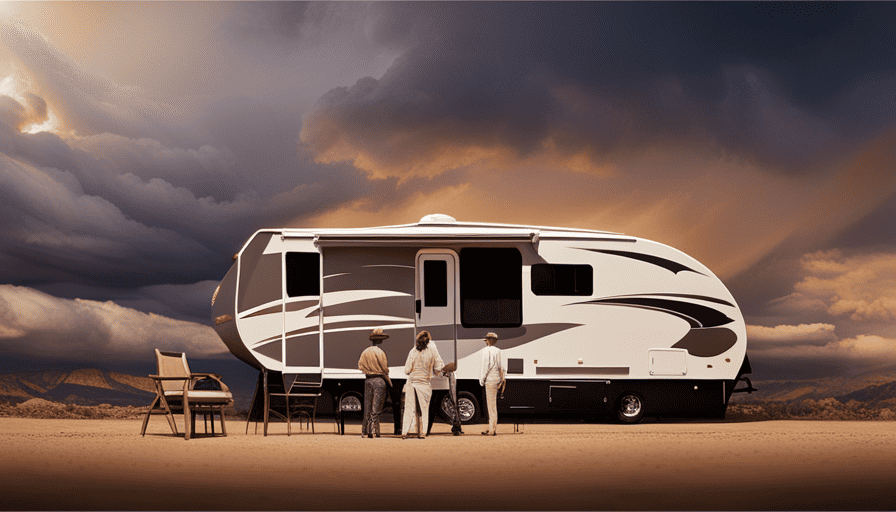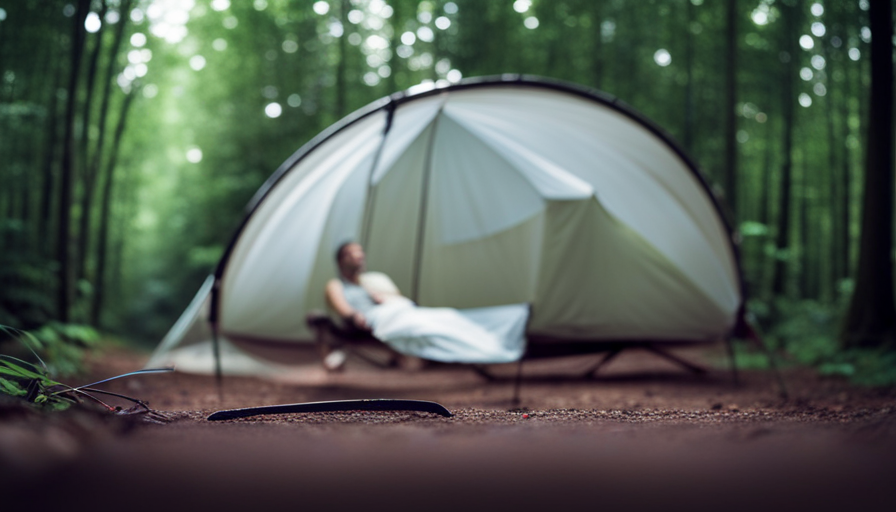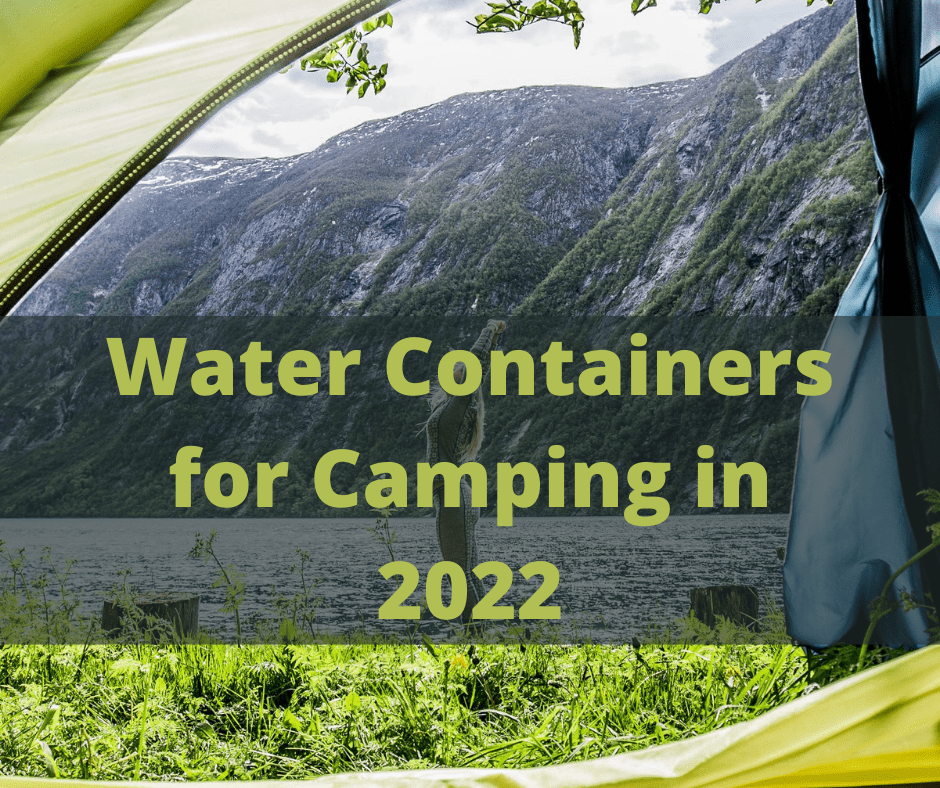Have you ever desired to taste the liberation that comes with camping off the grid, yet felt concerned about powering your camper?
Well, get ready to be blown away by the incredible potential of solar energy! With the right setup, you can harness the power of the sun to fuel your adventures and leave behind the constraints of traditional energy sources.
In this article, I will guide you through the process of determining how many solar panels you need to power your camper. By assessing your energy needs, considering your location and climate, and choosing the right solar panels, we will calculate the total wattage needed and determine the perfect number of panels for your setup.
And don’t worry, I’ll also provide tips on consulting a solar expert, installing and testing the system, as well as monitoring and maintaining it.
Get ready to embark on a journey where the sun becomes your ultimate power source!
Key Takeaways
- Assessing energy needs and solar potential is crucial in determining the number of solar panels required for a camper.
- Factors such as location, climate, shading, and inefficiencies should be taken into account for accurate panel installation.
- Higher efficiency panels generate more power from the same amount of sunlight, reducing the number of panels needed.
- Battery storage is important for managing excess energy and should be chosen based on energy consumption, trip duration, and charging efficiency.
Assess Your Energy Needs
You’ll want to determine how much energy you’ll need to power your camper, so you can enjoy the freedom of the open road without worrying about running out of power.
To assess your energy needs, start by estimating your energy consumption and assessing the solar potential of your camper.
To estimate energy consumption, consider the appliances and devices you plan to use in your camper. Make a list of all the electrical equipment, including lights, refrigerator, water pump, and any other devices you’ll be using regularly. Check the power ratings of each item and calculate the total energy consumption per day. This will give you an idea of how much power you’ll need to generate with your solar panels.
Next, assess the solar potential of your camper. Consider the size and orientation of the available roof space for installing solar panels. Also, take into account any potential shading from trees, buildings, or other obstructions that might affect the sunlight reaching your panels. This assessment will help you determine the number and size of solar panels required to meet your energy needs.
Once you have estimated your energy consumption and assessed the solar potential of your camper, you can move on to considering your location and climate. This step will help you optimize your solar panel setup and ensure maximum energy generation.
Consider Your Location and Climate
Make sure to take into account the specific conditions of your location and the climate you’ll be traveling in when determining the optimal number of panels needed to keep your camper fully charged. Location selection plays a crucial role in maximizing solar power generation. Different regions receive varying amounts of sunlight throughout the year, which directly affects panel efficiency. For example, areas with high average annual sunlight hours, such as Arizona or California, will require fewer panels compared to regions with lower sunlight exposure, like Alaska or Washington.
Climate considerations are equally important when determining the number of solar panels needed for your camper. Extreme temperatures, such as scorching summers or freezing winters, can impact panel performance and longevity. It’s essential to choose panels that are designed to withstand the specific climate conditions you’ll encounter during your travels.
To help you make an informed decision, consider the following table that shows the average sunlight hours and temperature ranges for different regions:
| Location | Average Sunlight Hours | Temperature Range (°F) |
|---|---|---|
| Arizona | 300+ | 40-110 |
| California | 250-300 | 45-90 |
| Alaska | 160-180 | -20-70 |
| Washington | 150-200 | 20-80 |
By analyzing this data, you can determine the optimal number of panels needed to meet your energy requirements while considering the specific conditions of your location and climate. Taking these factors into account will ensure that your solar panel setup is both efficient and reliable. As you consider the right solar panels for your camper, it’s important to evaluate their compatibility with your energy needs.
Choose the Right Solar Panels
When it comes to outfitting your mobile home with the ideal energy solution, selecting the appropriate solar modules that perfectly suit your needs is of utmost importance.
To ensure maximum efficiency, it’s crucial to evaluate the efficiency ratings of different solar panels available in the market. Efficiency refers to the amount of sunlight that the panel can convert into usable electricity. Higher efficiency panels are capable of generating more power from the same amount of sunlight, making them a better choice for powering your camper.
In addition to efficiency, it’s also essential to compare the costs of different solar panels. While higher efficiency panels may offer better performance, they often come at a higher price point. It’s important to strike a balance between efficiency and cost to find the most suitable solar panels for your camper.
By evaluating efficiency and comparing costs, you can select the right solar panels that’ll provide optimal energy generation for your camper.
Once you’ve chosen the appropriate panels, you can then move on to calculating the total wattage needed for your energy requirements.
Calculate the Total Wattage Needed
To ensure your mobile home is powered efficiently, it’s crucial to accurately calculate the total wattage required for your energy needs. Assessing your energy consumption is the first step in determining the right solar panels for your camper. By understanding your energy usage, you can make informed decisions about the size and number of solar panels needed.
Start by assessing the energy consumption of your appliances and devices. Consider the wattage of each item and the number of hours you use them daily. Sum up the wattage of all your appliances and devices to get the total wattage required. Remember to account for any potential future additions or upgrades.
Next, it’s important to understand solar panel efficiency. Solar panels have different efficiency ratings, which indicate how effectively they convert sunlight into electricity. Higher efficiency panels generate more power in the same amount of sunlight. This means you may require fewer panels if you choose higher efficiency options, reducing costs and maximizing space on your camper.
By accurately assessing energy consumption and understanding solar panel efficiency, you can determine the number of panels needed to power your camper effectively. This will ensure you have the right amount of solar power to meet your energy needs while enjoying the freedom and sustainability of off-grid living.
Determine the Number of Panels
To determine the number of panels needed, I divide the total wattage required by the wattage of each panel. This calculation gives me the minimum number of panels needed to achieve the desired power output.
However, it’s important to account for any shading or inefficiencies that may affect the panel’s performance. This ensures that the actual number of panels installed takes into consideration real-world conditions and provides an accurate solution for powering the camper.
Divide the total wattage needed by the wattage of each panel
Calculate how many solar panels you’ll need for your camper by dividing the total wattage needed by the wattage of each panel, and voila, you’ll be basking in the glorious power of the sun in no time.
To assess efficiency and optimize energy production, it’s crucial to determine the number of panels required. Begin by calculating the total wattage needed to power your camper. Then, identify the wattage of each solar panel. By dividing the total wattage needed by the wattage of each panel, you’ll obtain the number of solar panels required.
However, it’s important to account for any shading or inefficiencies that may affect the panels’ performance. These factors can decrease the overall energy production, so it’s essential to consider them when determining the number of panels needed.
Account for any shading or inefficiencies
Don’t forget to factor in any shading or inefficiencies that could impact the performance of your solar setup!
Shading can significantly reduce the output of your solar panels, so it’s crucial to assess the potential impact. Start by identifying any objects, such as trees or buildings, that could cast shadows on your camper. Measure the duration and intensity of shading throughout the day to determine the overall impact on your solar panels’ efficiency.
Additionally, consider the angle and orientation of your panels to maximize sunlight exposure. Efficiency calculations are essential in determining the number of panels needed to compensate for any shading or inefficiencies.
By accurately accounting for these factors, you can ensure that your solar setup provides sufficient power for your camper.
Moving forward, let’s consider battery storage to optimize your energy usage.
Consider Battery Storage
When considering battery storage for a camper, I need to determine if I need a battery to store excess energy and, if so, the capacity and type of battery required.
To make an informed decision, I’ll evaluate my energy needs and usage patterns. By analyzing the data, I can determine the appropriate battery capacity and type that’ll efficiently store and supply the necessary power for my camper.
Decide if you need a battery to store excess energy
If you’re planning on using solar panels to power your camper, deciding whether or not to invest in a battery for storing excess energy is a crucial consideration that can make your journey even more electrifying.
Battery storage plays a vital role in managing the excess energy generated by your solar panels. By having a battery, you can store the surplus energy during the day and use it during the night or on cloudy days when the solar panels may produce less electricity. This ensures a continuous power supply and reduces the reliance on external sources.
To determine the capacity and type of battery required, factors such as the energy consumption of your camper appliances, the duration of your trips, and the charging efficiency should be taken into account. By calculating these variables, you can make an informed decision on the most suitable battery for your camper setup.
Determine the capacity and type of battery required
To determine the capacity and type of battery you need, consider factors such as your energy consumption, trip duration, and charging efficiency, creating a customized power solution for your camper.
Start by calculating your energy consumption, which includes the power requirements of your appliances and devices. Determine how many hours you plan to use these devices each day and multiply that by their power consumption to get the total energy demand.
Next, consider the duration of your trips and the availability of sunlight in the area you’ll be traveling. This will help you determine how much energy you need to store in your battery.
Additionally, consider the charging efficiency of your solar panels and the type of battery that best suits your needs, such as lithium-ion or lead-acid.
By carefully assessing these factors, you can determine the optimal battery capacity and type for your camper.
To consult a solar expert, who can provide personalized advice based on your specific requirements, continue reading the next section.
Consult a Solar Expert
Imagine consulting with a solar expert who can guide you on the number of solar panels needed to power your camper. When it comes to determining the capacity and type of battery required, it is crucial to consider the efficiency of the solar panels. Solar panel efficiency is a measure of how well a panel converts sunlight into electricity. Higher efficiency panels will require fewer panels to generate the same amount of power, making them a cost-effective choice for your camper.
To give you an idea of the number of solar panels you might need, here is a table showcasing the average power output and efficiency of common solar panel sizes:
| Solar Panel Size | Average Power Output | Efficiency |
|---|---|---|
| 100W | 100W | 15-17% |
| 200W | 200W | 17-19% |
| 300W | 300W | 19-21% |
| 400W | 400W | 21-23% |
| 500W | 500W | 23-25% |
Based on this table, you can calculate the number of solar panels needed by dividing the power consumption of your camper by the average power output of the chosen panel size. Don’t forget to account for any additional power requirements, such as charging devices or running appliances.
Once you have consulted with a solar expert and determined the number of solar panels required, it’s time to install and test the system. Transitioning into the next section, installing and testing the system ensures that everything is functioning optimally for your camper’s power needs.
Install and Test the System
To install and test the solar system for my camper, I first mounted the solar panels securely on the roof. I made sure to position them in a way that maximized sunlight exposure throughout the day.
Next, I connected the panels to the battery and electrical system using the appropriate wiring and connectors. This ensured a seamless flow of power from the panels to the battery, allowing me to efficiently power my camper with solar energy.
Mount the solar panels on your camper
Mounting solar panels on your camper can greatly increase its energy efficiency. When it comes to mounting options, there are a few factors to consider, such as the available space on your camper’s roof, the angle at which the panels will receive sunlight, and the ease of installation. To help you make an informed decision, I have created a table outlining different mounting options and their advantages and disadvantages:
| Mounting Option | Advantages | Disadvantages |
|---|---|---|
| Roof Mount | Easy installation, protection from theft and damage | Limited orientation options, may affect aerodynamics |
| Ground Mount | Flexibility in panel orientation, easy maintenance | Requires additional space outside the camper |
| Pole Mount | Optimal panel orientation, adjustable tilt angle | More complex installation, may require additional parts |
By carefully considering these options, you can choose the best mounting method for your camper. Once the panels are securely mounted, the next step is to connect them to the battery and electrical system.
Connect the panels to the battery and electrical system
Once the panels are securely in place, it’s time to connect them to the battery and electrical system, ensuring a seamless flow of energy throughout your camper.
To achieve this, you’ll need to consider the connectivity options, wiring, and installation process.
When it comes to connecting the solar panels to your camper’s battery, there are a few options available. One common method is to use a charge controller, which regulates the voltage and current from the panels to prevent overcharging. Additionally, it helps protect your battery from damage.
Wiring the panels to the battery requires careful consideration of the wire gauge, length, and connection points. It’s essential to use the appropriate wire size to minimize voltage drop and maximize efficiency.
Once the wiring is complete, you’ll need to install the necessary connectors and terminals. This ensures a secure and reliable connection between the panels, battery, and electrical system.
With the panels connected and the electrical system properly set up, you can now move on to the next step of monitoring and maintaining the system, ensuring optimal performance and longevity.
Monitor and Maintain the System
Make sure you keep an eye on your solar panel system for any potential hiccups or mishaps, because let’s face it, you don’t want your camper to turn into a disco party with no power. Monitoring and maintaining your solar panel system is essential to ensure its optimal performance and longevity. By having a reliable monitoring system in place, you can easily track the energy production, detect any anomalies, and troubleshoot issues promptly. This allows you to take proactive measures and address any potential problems before they escalate.
To make monitoring easier, consider using a monitoring system that provides real-time data on your solar panel’s output, battery charge levels, and overall system performance. This data can be displayed in a user-friendly format, such as a table:
| Metric | Value |
|---|---|
| Solar Panel Output | X Watts |
| Battery Charge Level | Y % |
| System Performance | Z Efficiency |
Regularly check this table to ensure that the solar panel output matches your expected energy production. If you notice a significant decrease in output or a drop in battery charge levels, it could indicate a problem with your system. In such cases, you can refer to the troubleshooting section of your solar panel manual or seek professional assistance.
By diligently monitoring and promptly addressing any issues, you can enjoy your off-grid adventures without worrying about power shortages or system failures. It’s crucial to maintain a reliable and efficient solar panel system to make the most out of your camper’s off-grid capabilities. So, let’s dive into the next section and explore how to enjoy your off-grid adventures to the fullest.
Enjoy Your Off-Grid Adventures
I’ve had the pleasure of experiencing the freedom and independence that comes with solar-powered camping.
It’s truly an amazing feeling to be able to power my camper and enjoy all the amenities without relying on traditional electricity sources.
By maximizing the use of solar energy, I’m able to live a sustainable lifestyle and make the most of this renewable energy source.
Experience the freedom and independence of solar-powered camping
Discover the joy of solar-powered camping and experience the freedom and independence it brings to your adventures. By investing in a solar panel installation for your camper, you can harness the power of the sun to meet your energy needs while enjoying the great outdoors.
The benefits of solar powered camping are numerous. Firstly, you can say goodbye to noisy generators and fuel costs, as solar energy is clean and renewable. Secondly, you can recharge your electronic devices, power your lights, and even run small appliances, ensuring a comfortable and convenient camping experience.
Lastly, solar power allows you to minimize your impact on the environment, reducing your carbon footprint and promoting a sustainable lifestyle. Make the most of your renewable energy source for a sustainable lifestyle by optimizing your camper’s solar power system.
Make the most of your renewable energy source for a sustainable lifestyle
Harnessing the sun’s energy while camping allows you to experience the thrill of being a self-sufficient energy explorer, like an astronaut navigating the vastness of space. With sustainable energy solutions like solar power, you can make the most of your renewable energy source for a sustainable lifestyle.
Here are three benefits of solar power for campers:
-
Independence: Solar panels give you the freedom to camp in remote locations without worrying about access to electricity. You can enjoy the serenity of nature while still having the power you need for essential devices.
-
Cost savings: By utilizing solar power, you can reduce or even eliminate the need for expensive generator fuel. This not only saves you money in the long run but also reduces your carbon footprint.
-
Environmental friendliness: Solar power is a clean and renewable energy source. By using solar panels to power your camper, you’re reducing greenhouse gas emissions and contributing to a healthier planet.
Embracing solar power for camping offers numerous benefits, making it an excellent choice for a sustainable and eco-friendly lifestyle.
Frequently Asked Questions
How do I safely install solar panels on my camper?
To safely install solar panels on a camper, it’s important to take certain safety precautions. First, ensure that the panels are securely mounted and properly grounded. Use appropriate protective gear, such as gloves and safety glasses, when handling the panels and tools.
Avoid common installation mistakes like incorrect wiring or overloading the electrical system. Following manufacturer guidelines and consulting professionals can help ensure a safe and successful installation process.
What are the benefits of using battery storage for my camper’s solar panel system?
Battery storage benefits are crucial in maximizing efficiency for a camper’s solar panel system. By using battery storage, excess energy generated by the solar panels can be stored and used during times when the panels aren’t producing enough power. This ensures a constant and reliable power supply, even during cloudy days or at night.
Additionally, battery storage allows for better management of energy usage and reduces reliance on external power sources, making the camper more self-sufficient and environmentally friendly.
Are there any government incentives or tax credits available for installing solar panels on a camper?
Government incentives and tax credits can greatly offset the cost of installing solar panels on a camper. In fact, according to a recent study, individuals who take advantage of these incentives can save up to 30% on the total installation costs.
This means that not only will you be reducing your carbon footprint and enjoying the benefits of solar power, but you’ll also be rewarded for your eco-friendly choices.
So, why wait? Start exploring the government incentives and tax credits available in your area today.
Can I use my camper’s solar panel system to power appliances like a refrigerator or air conditioner?
Yes, you can use your camper’s solar panel system to power appliances like a refrigerator or air conditioner. However, there are limitations when using solar power in remote camping areas. High energy appliances such as air conditioners require a significant amount of power, which may exceed the capacity of a typical camper solar panel system. It’s important to assess your energy needs and consider alternative power sources or energy-efficient appliances to optimize your solar power usage.
How can I ensure the longevity and efficiency of my camper’s solar panel system?
To ensure the longevity and efficiency of my camper’s solar panel system, I approach it as I would a well-tuned instrument. Just like a skilled musician maintains their instrument, I prioritize long-term maintenance and optimizing performance.
Regularly inspecting and cleaning the panels, checking connections, and monitoring output levels are crucial. Additionally, investing in quality components, utilizing advanced charge controllers, and implementing efficient wiring practices contribute to a highly effective solar power system.
Can I Sell a Camper with a Lien if I Install Solar Panels?
Selling a camper with a lien can be a complex process, but installing solar panels does not necessarily affect its sale. However, it’s crucial to ensure that the lienholder’s rights are upheld throughout the transaction. Seek legal advice to navigate the intricacies and ensure a smooth sale.
Conclusion
After assessing my energy needs and considering my location and climate, I chose the right solar panels for my camper. By calculating the total wattage needed, I determined that I needed X number of panels to power my off-grid adventures.
Consulting a solar expert was crucial in ensuring the system was installed and tested correctly. Now, as I monitor and maintain the system, I can enjoy the freedom of being powered by the sun. With X panels providing clean energy, the image of my camper gleaming under the sun’s rays is a testament to the power of solar technology.

